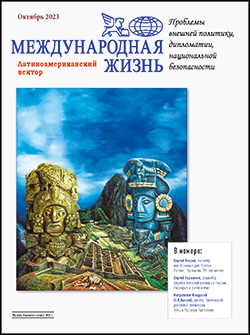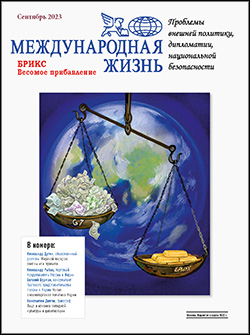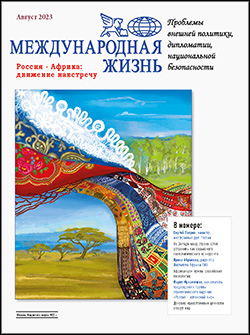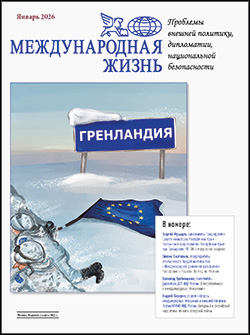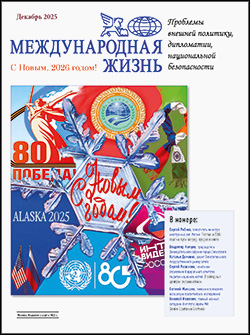Serguei Lavrov, Minister of Foreign Affairs of the Russia
The 25-th anniversary of the establishment of diplomatic relations with the countries of Central Asia
In 2017 it completes 25 years from the date of establishment of diplomatic relations with the countries of Central Asia. During this period of time these countries turned to be full-fledged participants of international life. Russia has established relations of alliance or strategic partnership with Kazakhstan, Kyrgyzstan, Tajikistan, Turkmenistan and Uzbekistan. Today we have strong law base of more than 900 bilateral treaties and intergovernmental agreements.
POLITICS
Frolov А., Nadein-Rayevsqui V., Turkey: looking for a spot of support
With a notorious crisis left behind there is some positive dynamics in the relationship between Russia and Turkey in spite of the existence of some knots, hard to undo, on the way, but it is due to several objective reasons. Our relations naturally can’t be analyzed out of context of deep political and social transformations occurring inside Turkish society. You should look into them in order to find the sources of the metamorphoses of Turkish politics .
Zaritsky B., Germany in the post-Soviet space
The bilateral trade between Russia and the FRG went on dropping in 2016 and the number of companies with German capital reduced by 400. It has been a turn for the worst in the activities between Germany and other countries of the post-Soviet space including the Ukraine, Moldova and Georgia given with the status of the EC associated members and respective trade preferences. However, basing on analysis of the existing situation and on long-term purposes of German policy related to the former republics of the USSR you may see that the post-Soviet space is still highly interesting for Germany in spite of decrease in the bilateral trade.
TRENDS
Kuznechevsky V., Overcoming uncertainty. A new concept of Russian foreign policy
In the last 25 years, that is - during the period since the emergence in the international stage of a new sovereign state entity in December of 1991 and up to now – this new foreign policy concept would be the fifth document provided by the supreme Russian leadership delivering the attitude towards priority lines, goals and objectives of foreign policy of the Federation of Russia. But this event, taken from a practical (businesslike) point of view and not from a formal one, actually would be the first document of such a scale and of the kind, because it is totally different from the previous ones.
Likhachev V., A way to build a lawful world: Russian offer
The new Foreign Policy Concept of the Federation of Russia accepted in 2016 is based on the fundamental trends of the international system in the 21-st century. It is beyond question that it determines axial consistency and application-oriented nature of the document signed by the President of Russia, Vladimir V. Putin. Its adoption reflects a geopolitical responsibility of the FR for a progressive development of the world order.
Gadgiev К., Priorities andshortcomings of a great project
The European Union is one of the most important bearing structures of the contemporary world order. This project according to its importance and influence on the world processes to a certain extent could be compared with the great American experiment, quite successfully carried out, and with just as much great, but artificially interrupted by virtue of a whole bunch of reasons, Soviet experiment. The managers of the project could, initially pursue some highly humanistic purposes of conciliation of peoples and making conditions for their joint peaceful life. The question is whether these initiatives could be put into practice.
ECONOMIC FACTOR
Kostiunina G., South Korean policy of participation in regional trade agreements
The Republic of Korea is one of the Ten World Exporters and occupies the sixth place in the world export, according to the results of 2015, and the ninth place in the world import. During the period of 1980-2015 its specific weigh in the world export grew from 0,85% to 3,2% and in the world import - from 1,07% tо 2,6%. So the participation of South Korea in the international division of labor has been steadily intensifying for more then four decades.
Nevskaya А., Export of the production of creative industries: the EU, the USA and China’s experience
Creative industries are more and more often looked at as an important driver of economic growth making it possible for a number of countries and companies to integrate international chains of added value and at the same time solving some social problems, such as unemployment. According to the UNESCO, the largest international organization that monitors and studies creative industries, this entity includes goods and services produced with the use of a cultural component along with innovations of different kind. The term “creativity” itself implies generating new ideas and its transformation into values i.e. providing them with utility.
AMERICAN VECTOR
Rogovsky Е.,Elections in the USA: success of technology innovations
The Internet didn’t just grow up during several decades since its creation, but by now it has turned to be contentious. The cyberspace has became a place of a rigid economic competition, ideological struggle, resistance to foreign cyber aggressors, fight with terrorism and with theft of intellectual propriety and personal data, - all this going simultaneously. It was quite important the role that the Internet had been playing during the President electoral campaign in the USA.
Sulima Е., Shepelev М., “Sly Dick’s” revenge? Donald Trump’s policy in the light of Richard Nixon’s presidency
Just in order to understand the logic of Donald Trump’s political thinking it would be important to remind that even in March of 1990, in his interview to “Playboy” he predicted the disintegration of the USSR. Having accessed the state of the Soviet system of that time as a “real disaster”, Trump declared that “soon there will be a revolution” putting it quiet clearly: “My reproof of Gorbachev – he is too weak”. And then: “I think, he will be thrown down, - he shows just an incredible weakness”. And contrary, he saw “an example of a useful strength” in a forcible suppression of the protest action in Tiananmen Square by Chinese authorities.
Kozin V., Donald Tramp’s nuclear strategy: first outlines
Having assumed office of the President of the United States Donald Trump inherited from his predecessor, Barack Obama, a sizeable nuclear-missile potential, both strategic and tactical one, in the form of nuclear military loads along with means of delivery and also a nuclear strategy of “unconditional offensive nuclear deterrence” providing an “anticipatory and pre-emptive” nuclear strike directed practically to any country in the world if it isn’t an ally, friend or partner of Washington.
HISTORY AND POLITICS
Kravchenco M., The year of1943: the history in documents
On the 8 of February of the current year in the “Big Mansion” of the Ministry of Foreign Affairs of Russia took place a formal presentation of the 24-th volume of the collection “Documents of Foreign Policy of the URSS”, taking part in the event the Minister of Foreign Affairs, Serguei V. Lavrov, officials from the Federal Archive Agency, representatives of academic circles and diplomatic corps.
Pechatnov V., Looking through the collection “Documents of Foreign policy of the URSS. 1943”
It have been passed six years since the publishing of the previous volume from the series “Documents of Foreign Policy of the URSS”, while readers were looking forward to a sequel of these series that a long time ago turned to be the basic source concerning the history of our country’s foreign policy. Documents from the Archive of Foreign Policy of the FR published for the first time, - many of them have been declassified just recently ( first of all, coded cable messages), - certainly cause an utmost interest. And with it the compilers were quite reasonable including into the collection also a number of documents which had been already published, - that was necessary to create a complete picture of international relations existing that time.
Bedjanyan Y., Tarassov K., The 50-th anniversary of the Consulate General of the URSS in Montreal
Half of a century ago Canadian province of Quebec witnessed a momentous event in the history of the two countries. On the 6-th of March it completed fifty years since the arrival of Consul-General of the USSR, Pavel F. Safonov, in Montreal. This important hallmark contributed to the resumption of the activities of the consular representation after a break of several decades and to opening of “a new book” in our relationship with “French-speaking Canada”.
Reinhardt R., History of Russian diplomacy: competence and love of homeland
Recently has come off the press the first volume of two-volume edition titled “History of Russian Diplomacy”, prepared by professors of the Chair of Diplomacy at the MGIMO of the Ministry of Foreign Affairs of Russia, Raikov Y.A. and Samoilenco V.V. together with the Permanent Representative of the FR to the UNESCO, Kuznetsov A.I., under the editorship of the chancellor of the MGIMO, academician, Torkunov A.V. and the head of the Chair of Diplomacy, Panov A.N. The idea of a textbook like this, ripening for a long time was implemented on the eve of the 100-th anniversary of the date, that had been crucial for Russian history and for the history of Russian diplomacy as well. It has been preceded by a long and minute activity that had been started yet in 1990-s in order to work out the concept of the book.
Olenchenco V., Mejevich N., Baltic research in 2016
In 2016 Russian expert and research community actively proceeded with studies carried out with the purpose to improve understanding of the processes occurring in the Baltic Region, first of all - with regard to Russian and Baltic bilateral relationship. That’s why the focus of attention was concentrated on concretization of the degree of influence of the internal and external factors forming political line of the Baltic countries and determining trends of their economic development.
Читайте другие материалы журнала «Международная жизнь» на нашем канале Яндекс.Дзен.
Подписывайтесь на наш Telegram – канал: https://t.me/interaffairs

 22:43 21.03.2017 •
22:43 21.03.2017 • 